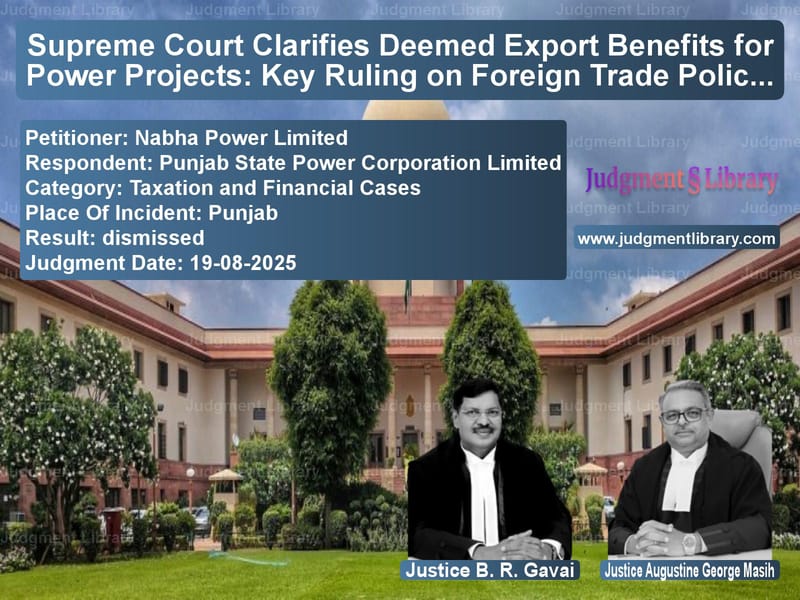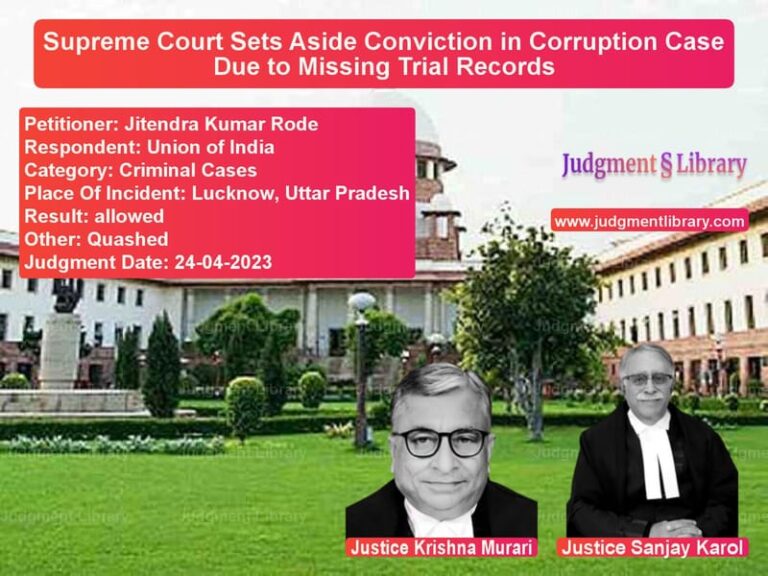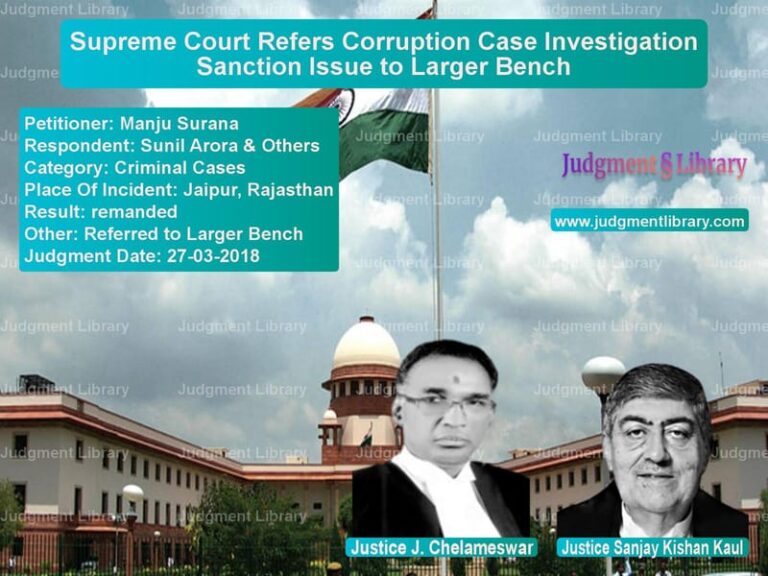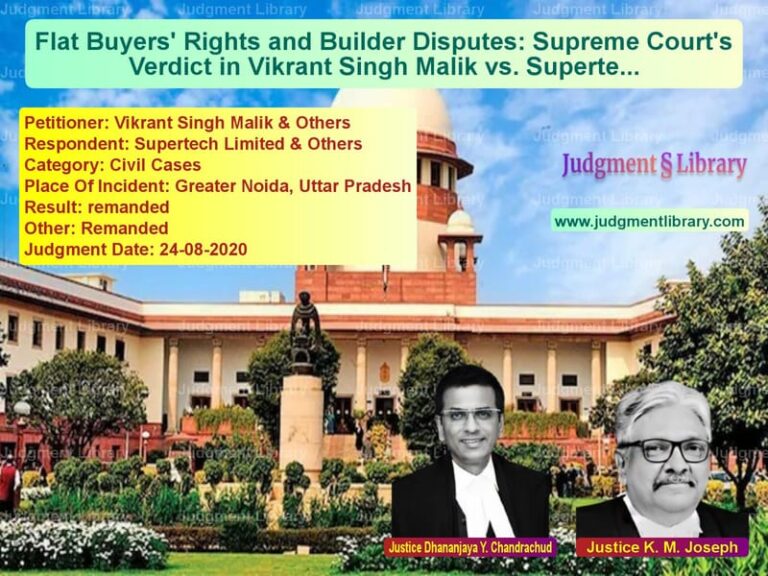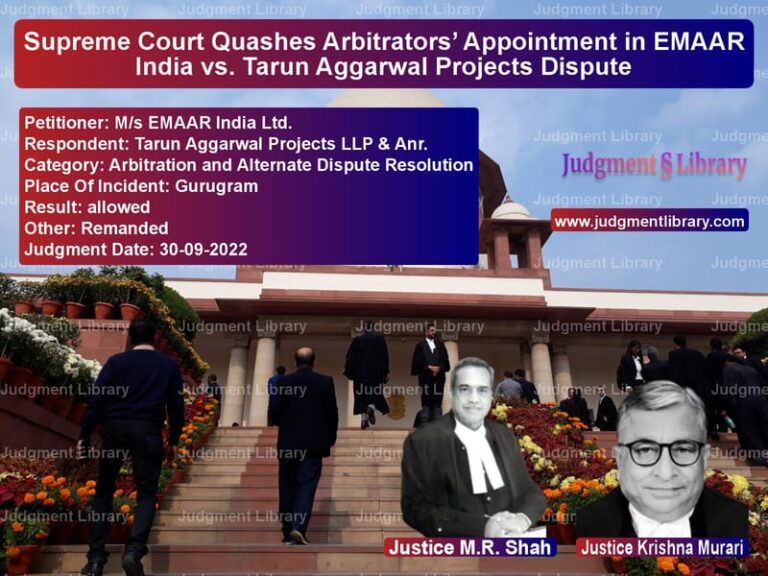Supreme Court Clarifies Deemed Export Benefits for Power Projects: Key Ruling on Foreign Trade Policy
In a landmark judgment that clarifies the scope of export incentives for infrastructure projects, the Supreme Court of India has delivered a significant ruling on the eligibility of power projects for deemed export benefits under the Foreign Trade Policy. The case involved two major power companies – Nabha Power Limited and Talwandi Sabo Power Limited – who claimed they were entitled to fiscal benefits under India’s export promotion schemes for their thermal power projects in Punjab. The dispute centered around whether these power plants, which were constructed in-situ (on-site), could qualify as ‘goods’ manufactured in India and thus be eligible for benefits typically reserved for exported products.
The legal battle spanned nearly a decade, moving through the Punjab State Electricity Regulatory Commission, the Appellate Tribunal for Electricity, and finally to the Supreme Court. At its heart were fundamental questions about how India’s export incentive schemes apply to large infrastructure projects and what constitutes a ‘change in law’ that would trigger compensation under power purchase agreements.
The Core Legal Questions
The Supreme Court identified three principal questions that needed resolution in this complex case. First, whether deemed export benefits under the Foreign Trade Policy 2009-2014 were legitimately available to the power companies as of the bid cut-off date, and whether subsequent notifications by the Directorate General of Foreign Trade amounted to a ‘Change in Law’ under the Power Purchase Agreement. Second, whether a Press Release about a Cabinet Decision changing threshold requirements for deemed export benefits would constitute a ‘Change in Law’. Third, if either of these qualified as a change in law, whether the companies were entitled to compensation.
The Power Companies’ Arguments
Nabha Power Limited and Talwandi Sabo Power Limited presented detailed arguments claiming they were entitled to the benefits. They argued that “the conditions prescribed under the FTP have been unambiguously satisfied” and that “the whole power plant falls within the definition of ‘capital goods'” making them eligible for deemed export benefits.
The companies contended that “the whole process of developing a power plant constitute as ‘manufacture'” when examined against the Foreign Trade Policy’s definition, which includes making, assembling, fabricating, processing, and bringing new product into existence. They emphasized that “assembly and commissioning at site to constitute ‘manufactured in India’ for the purpose of availing deemed export benefits under the FTP.”
Regarding the change in law question, the appellants argued that “Article 13.1.1(ii) expressly extends to ‘any change in any law,’ a phrase wide enough to include executive notifications issued under statutory authority, which alter duties, levies or benefits.” They maintained that the Public Notices issued in April 2011 “are legislative in character and binding, triggering contractual relief.”
The State Power Corporation’s Counterarguments
Punjab State Power Corporation Limited vigorously defended against these claims, arguing that “the FTP incentive scheme was designed exclusively for ‘goods’, being tangible, movable items, as classifiable under the Customs Tariff Schedule, and not for immovable assets such as power plants.”
PSPCL emphasized that “the FTP, by its very nature, was framed to promote exports of manufactured goods and, accordingly, extended benefits to goods that were exported or supplied against foreign exchange earnings” and that “a thermal power plant constructed in-situ did not meet the definitional threshold of ‘goods’ or ‘manufacture’ under the FTP or law(s) on central excise.”
On the change in law issue, PSPCL contended that “only statutory enactments or delegated legislation under the FTP Act 1992 qualify, and that administrative notices, lacking the force of regulation, cannot be contractual triggers.”
The Court’s Analysis on Change in Law
The Supreme Court delivered a comprehensive analysis of what constitutes a change in law under the Power Purchase Agreement. The Court examined the specific contractual language, noting that “Article 13.1.1. defined ‘Change in Law’ as an enactment, amendment or repeal after 02.10.2009.”
The Court made a crucial distinction between policy announcements and legally binding instruments, stating that “only duly promulgated notifications, and not Press Releases or Communications, would constitute as ‘Change in Law’.” The judgment emphasized that “law, whether parliamentary or subordinate, must be published to enable them to take effect” and that “the Central Government was neither a party to the PPA nor was the same subject to any judicially enforceable promise and no order of any court gave the said Press Release a legal force.”
The Five Prerequisites for Deemed Export Benefits
The Court established five essential conditions that must be satisfied to qualify for deemed export benefits under the Foreign Trade Policy. First, “the claim for Deemed Export Benefits relates exclusively to ‘goods’ and is inapplicable to any other thing which is not ‘goods’.” Second, “the goods to be supplied must be ‘manufactured in India’.” Third, “there must be an act constituting ‘supply of goods’ to the power projects.” Fourth, “the act of ‘supply of goods’ is either by the main contractor and/or the sub-contractor to the concerned power project.” Fifth, “the supply is undertaken strictly in accordance with the procedural framework prescribed under International Competitive Bidding.”
Are Power Plants ‘Goods’?
The Court delivered a definitive answer on whether power plants qualify as ‘goods’ under the Foreign Trade Policy. The judgment stated that “in the common parlance, the term ‘goods’ denotes movable items and shall exclude immovable items” and that “an immovable property, especially a machinery embedded to earth, as in the instant case, would fail the aforesaid test.”
The Court elaborated that “it stands settled that an immovable property, especially a machinery embedded to earth, as in the instant case, would fail the aforesaid test” of marketability that defines goods. The judgment made clear that “the correct means to analyse and determine expression ‘capital goods’ would be subject to the definition of the term ‘goods’ especially when Para 9.12 of the FTP only encompasses movable items.”
The Manufacturing Question
On whether constructing a power plant constitutes ‘manufacture’, the Court referenced established legal principles, noting that “‘manufacture’ implies a change, but every change is not manufacture and yet every change of an article is the result of treatment labour and manipulation. But something more is necessary and there must be transformation; a new and different article must emerge having a distinctive name, character or use.”
The judgment emphasized that “the expression ‘manufacture’ is normally related to movable articles and goods. It cannot be employed to denote construction of a building or a dam or a bridge” and that “‘manufacture’ and ‘produce’ are normally associated with movable articles and goods, big and small but they are never employed to denote the construction activity of the nature involved in the construction of a dam or for that matter a bridge, a road and a building.”
Supply and International Competitive Bidding Requirements
The Court also found that the power companies failed to meet the supply and International Competitive Bidding requirements. The judgment noted that “the essence of deemed export benefits lay in the supply of goods to power projects, not in power procurement arrangements” and that “reliance on Tariff-Based Competitive Bidding by the Appellants for selection of the power project developer cannot be equated with the mandate of the ICB for supply of goods.”
The Court observed that “no evidence has been produced on record by the Appellants to determine whether such a mandate i.e. ICB process was adopted by them for procurement of goods concerned” and that “such procurement of the components was done through directly entering into contract(s) with their subsidiaries or joint venture or related companies.”
Final Ruling and Implications
The Supreme Court ultimately dismissed the appeals, concluding that “the Appellants have failed to impress this Court with their submissions in these Civil Appeals and we find no ground to interfere with the Impugned Judgment.” The Court determined that “they were not entitled to the deemed export benefits under Para 8.3 of the FTP” and consequently, “there cannot arise any question for compensation to the Appellants by the PSPCL as a means of restitutionary relief.”
This judgment provides crucial clarity on the scope of India’s export incentive schemes and establishes important precedents for how large infrastructure projects interact with foreign trade policies. The ruling emphasizes that beneficial schemes must be interpreted within their defined boundaries and that not all economic activities can qualify for export incentives designed specifically for movable goods. The decision also reinforces the distinction between policy announcements and legally binding changes that trigger contractual compensation mechanisms, providing valuable guidance for future disputes in the energy and infrastructure sectors.
Petitioner Name: Nabha Power Limited.Respondent Name: Punjab State Power Corporation Limited.Judgment By: Justice B. R. Gavai, Justice Augustine George Masih.Place Of Incident: Punjab.Judgment Date: 19-08-2025.Result: dismissed.
Don’t miss out on the full details! Download the complete judgment in PDF format below and gain valuable insights instantly!
Download Judgment: nabha-power-limited-vs-punjab-state-power-c-supreme-court-of-india-judgment-dated-19-08-2025.pdf
Directly Download Judgment: Directly download this Judgment
See all petitions in Customs and Excise
See all petitions in Contract Disputes
See all petitions in Corporate Compliance
See all petitions in Tax Refund Disputes
See all petitions in unfair trade practices
See all petitions in Judgment by B R Gavai
See all petitions in Judgment by Augustine George Masih
See all petitions in dismissed
See all petitions in supreme court of India judgments August 2025
See all petitions in 2025 judgments
See all posts in Taxation and Financial Cases Category
See all allowed petitions in Taxation and Financial Cases Category
See all Dismissed petitions in Taxation and Financial Cases Category
See all partially allowed petitions in Taxation and Financial Cases Category

